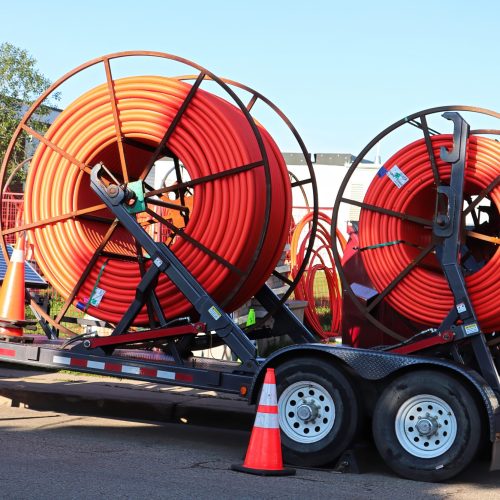US says net neutrality is price regulation and is banned in $42B grant program.
Credit: Getty Images | Yuichiro Chino
The Trump administration is refusing to give broadband-deployment grants to states that enforce net neutrality rules or price regulations, a Commerce Department official said.
The administration claims that net neutrality rules are a form of rate regulation and thus not allowed under the US law that created the $42 billion Broadband Equity, Access, and Deployment (BEAD) program. Commerce Department official Arielle Roth said that any state accepting BEAD funds must exempt Internet service providers from net neutrality and price regulations in all parts of the state, not only in areas where the ISP is given funds to deploy broadband service.
States could object to the NTIA decisions and sue the US government. But even a successful lawsuit could take years and leave unserved homes without broadband for the foreseeable future.
Roth, an assistant secretary who leads the National Telecommunications and Information Administration (NTIA), said in a speech at the conservative Hudson Institute on Tuesday:
Consistent with the law, which explicitly prohibits regulating the rates charged for broadband service, NTIA is making clear that states cannot impose rate regulation on the BEAD program. To protect the BEAD investment, we are clarifying that BEAD providers must be protected throughout their service area in a state, while the provider is still within its BEAD period of performance. Specifically, any state receiving BEAD funds must exempt BEAD providers throughout their state footprint from broadband-specific economic regulations, such as price regulation and net neutrality.
Trouble for California and New York
The US law that created BEAD requires Internet providers that receive federal funds to offer at least one “low-cost broadband service option for eligible subscribers,” but also says the NTIA may not regulate broadband prices. “Nothing in this title may be construed to authorize the Assistant Secretary or the National Telecommunications and Information Administration to regulate the rates charged for broadband service,” the law says.
The NTIA is interpreting this law in an expansive way by categorizing net neutrality rules as impermissible rate regulation and by demanding statewide exemptions from state laws for ISPs that obtain grant money.
This would be trouble for California, which has a net neutrality law that’s nearly identical to FCC net neutrality rules repealed during President Trump’s first term. California beat court challenges from Internet providers in cases that upheld its authority to regulate broadband service.
The NTIA stance is also trouble for New York, which has a law requiring ISPs to offer $15 or $20 broadband plans to people with low incomes. New York defeated industry challenges to its law, with the US Supreme Court declining opportunities to overturn a federal appeals court ruling in favor of the state.
But while broadband lobby groups weren’t able to block these state regulations with lawsuits, their allies in the Trump administration want to accomplish the goal by blocking grants that could be used to deploy broadband networks to homes and businesses that are unserved or underserved.
This already had an impact when a California lawmaker dropped a proposal, modeled on New York’s law, to require $15 monthly plans. As we wrote in July, Assemblymember Tasha Boerner said she pulled the bill because the Trump administration said that regulating prices would prevent California from getting its $1.86 billion share of BEAD. But now, California could lose access to the fund anyway due to the NTIA’s stance on net neutrality rules.
We contacted the California and New York governors’ offices about Roth’s comments and will update this article if we get any response.
Roth: State laws “threaten financial viability” of projects
Republicans have long argued that net neutrality is rate regulation, even though the rules don’t directly regulate prices that ISPs charge consumers. California’s law prohibits ISPs from blocking or throttling lawful traffic, prohibits fees charged to websites or online services to deliver or prioritize their traffic, bans paid data cap exemptions (also known as “zero-rating”), and says that ISPs may not attempt to evade net neutrality protections by slowing down traffic at network interconnection points.
Roth claimed that state broadband laws, even if applied only in non-grant areas, would degrade the service offered by ISPs in locations funded by grants. She said:
Unfortunately, some states have adopted or are considering adopting laws that specifically target broadband providers with rate regulation or state-level net neutrality mandates that threaten the financial viability of BEAD-funded projects and undermine Congress’s goal of connecting unserved communities.
Rate regulation drives up operating costs and scares off investment, especially in high-cost areas where every dollar counts. State-level net neutrality rules—itself a form of rate regulation—create a patchwork of conflicting regulations that raise compliance costs and deter investment.
These burdens don’t just hurt BEAD providers; they hurt the very households BEAD is meant to connect by reducing capital available for the hardest-to-reach communities. In some cases, they can divert investment away from BEAD areas altogether, as providers redirect resources to their lower-cost, lower-risk, non-BEAD markets.
State broadband laws “could create perverse incentives” by “pressuring providers to shift resources away from BEAD commitments to subsidize operations in non-BEAD areas subject to burdensome state rules,” Roth said. “That would increase the likelihood of defaults and defeat the purpose of BEAD’s once-in-a-generation investment.”
The NTIA decision not to give funds to states that enforce such rules “is essential to ensure that BEAD funds go where Congress intended—to build and operate networks in hard-to-serve areas—not to prop up regulatory experiments that drive investment away,” she said.
States are complying, Roth says
Roth indicated that at least some states are complying with the NTIA’s demands. These demands also include cutting red tape related to permits and access to utility poles and increasing the amount of matching dollars that ISPs themselves put into the projects. “In the coming weeks we will announce the approval of several state plans that incorporate these commitments,” she said. “We remain on track to approve the majority of state plans and get money out the door this year.”
Before Trump won the election, the Biden administration developed rules for BEAD and approved initial funding plans submitted by every state and territory. The Trump administration’s overhaul of the program rules has delayed the funding.
While the Biden NTIA pushed states to require specific prices for low-income plans, the Biden administration prohibited states “from explicitly or implicitly setting the LCSO [low-cost service option] rate” that ISPs must offer. Instead, ISPs get to choose what counts as “low-cost.”
The Trump administration also removed a preference for fiber projects, resulting in more money going to satellite providers—though not as much as SpaceX CEO Elon Musk has demanded. The changes imposed by the Trump NTIA have caused states to allocate less funding overall, leading to an ongoing dispute over what will happen to the $42 billion program’s leftover money.
Roth said the NTIA is “considering how states can use some of the BEAD savings—what has commonly been referred to as nondeployment money—on key outcomes like permitting reform,” but added that “no final decisions have been made.”
Jon is a Senior IT Reporter for Ars Technica. He covers the telecom industry, Federal Communications Commission rulemakings, broadband consumer affairs, court cases, and government regulation of the tech industry.






